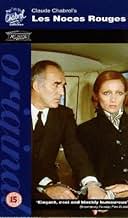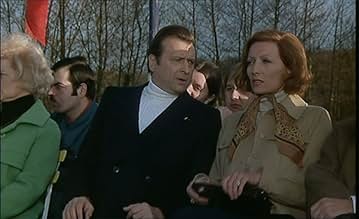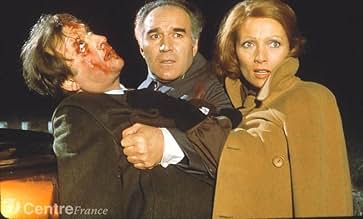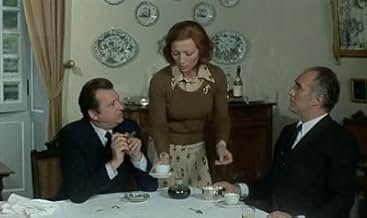AVALIAÇÃO DA IMDb
6,9/10
2,2 mil
SUA AVALIAÇÃO
Adicionar um enredo no seu idiomaIn a small French town, the mayor discovers his wife is cheating on him, a betrayal that eventually leads to murder.In a small French town, the mayor discovers his wife is cheating on him, a betrayal that eventually leads to murder.In a small French town, the mayor discovers his wife is cheating on him, a betrayal that eventually leads to murder.
- Direção
- Roteiristas
- Artistas
- Prêmios
- 1 vitória e 1 indicação no total
- Direção
- Roteiristas
- Elenco e equipe completos
- Produção, bilheteria e muito mais no IMDbPro
Avaliações em destaque
A few years after being one of the French New Wave four aces, Claude Chabrol said goodbye to film experiments and embarked on a very active commercial directorial career. For over 30 years he has produced films at a rate of about one each year, most of them thrillers, whose heroes belong to the French bourgeoisie, high or mid-class. 'Les noces rouges' made in 1973 belongs to these years. The setting in which the action takes place is a small French town where everybody knows everybody and where secrets seem very difficult to keep. And yet, from the first scenes of the film we realize that behind the quiet streets and facades, in the villas or apartments of the heroes with comfortable furniture and beautiful objects, there are hidden passions and secrets. Sooner or later, it is inevitable that corpses will show up.
If we were to look for a motto for this film, it would be 'how stupid lovers can be'. With question mark or exclamation mark - you can choose. Lucienne (Stéphane Audran) has an extramarital affair with Pierre Maury (Michel Piccoli), the deputy of her husband, the politician, mayor and representative Paul Delamare (Claude Piéplu). Both are unhappily married, which would be the justification for their infidelity that combines the passion and the grotesque, because in a provincial town like the one where they live (and where they also are public figures) such liaisons are difficult to consume and keep secret. Is murder the only way out? The script is inspired by a true crime case, so it seems that life not only beat the film but in this case even anticipated it.
As in many other films of Claude Chabrol it is difficult to cling to a character and identify with him or her. Paul's sick wife and Lucienne's teenage daughter may be the only innocent figures in this quiet but sinister story, sinister because of the violence that erupts in various forms, and because of the moral decay of the characters, be they criminals or victims. Lucienne's character seemed insufficiently developed, I think it was a much more interesting story than it results from the film in the biography of this woman who begins her life as a teenage mother, marries a man who does not love her but yet she supports his political career and keeps the social appearances, only to fall prey to passion on a path that can only lead to tragedy. Stéphane Audran seemed less inspired than in other films, Michel Piccoli does a good role but not one of his best, and Claude Piéplu, the less famous of the three, manages to create the most interesting character as the husband who accepts his wife's infidelity, being more much interested in his political career sprinkled with dubious business. The thriller plot plays a secondary role, the social commentary and the characterization of the characters seem to be the focal points of the director. Also pay attention to the costumes created by Karl Lagerfeld. 'Les noces rouges' may not be a high point in the career of Chabrol or his actors, but there are enough good reasons to give him a chance to watch or revise.
If we were to look for a motto for this film, it would be 'how stupid lovers can be'. With question mark or exclamation mark - you can choose. Lucienne (Stéphane Audran) has an extramarital affair with Pierre Maury (Michel Piccoli), the deputy of her husband, the politician, mayor and representative Paul Delamare (Claude Piéplu). Both are unhappily married, which would be the justification for their infidelity that combines the passion and the grotesque, because in a provincial town like the one where they live (and where they also are public figures) such liaisons are difficult to consume and keep secret. Is murder the only way out? The script is inspired by a true crime case, so it seems that life not only beat the film but in this case even anticipated it.
As in many other films of Claude Chabrol it is difficult to cling to a character and identify with him or her. Paul's sick wife and Lucienne's teenage daughter may be the only innocent figures in this quiet but sinister story, sinister because of the violence that erupts in various forms, and because of the moral decay of the characters, be they criminals or victims. Lucienne's character seemed insufficiently developed, I think it was a much more interesting story than it results from the film in the biography of this woman who begins her life as a teenage mother, marries a man who does not love her but yet she supports his political career and keeps the social appearances, only to fall prey to passion on a path that can only lead to tragedy. Stéphane Audran seemed less inspired than in other films, Michel Piccoli does a good role but not one of his best, and Claude Piéplu, the less famous of the three, manages to create the most interesting character as the husband who accepts his wife's infidelity, being more much interested in his political career sprinkled with dubious business. The thriller plot plays a secondary role, the social commentary and the characterization of the characters seem to be the focal points of the director. Also pay attention to the costumes created by Karl Lagerfeld. 'Les noces rouges' may not be a high point in the career of Chabrol or his actors, but there are enough good reasons to give him a chance to watch or revise.
I believe this film is based on a real double murder by Bernard Coustie in 1970, and follows that closely until the final scenes. I was shocked by the Benny Hill quality of the love scenes which undermines the early scenes. The acting as a whole has a semi-comic feel and the film is short and feels perfunctory - if it wasn't Chabrol would we even remember it?
However, the score is terrific, and as a time-capsule of small town France it is entertaining.
Under the surface of middle class boredom and entrapment, love for the forbidden and unattainable drives two respectable, kind people to murder. It isn't realistic, yet feels real, as does the daughter's unconscious urge to destroy her beloved mother. The murder victims are at once pitiable and richly deserve their ends. The performances are great all round.
Les noces rouges is, first, just a correct film. You recognize Claude Chabrol in each scene , and the performances of Stephane Audran, Claude Pieplu , Michel Piccoli is one of fundamental marks. It is not the film to convince - the love affair between Lucinne and Pierre is only conventional, the effort of Pieplu reminds the steps of many politicians,Eliana de Santis gives her the best , in minimalism frame, reminding the rafinated cruelty of childhood, Clotilde Joao seems perfect in the shadow of the character of Clotilde Maury.Like many films of Chabrol, Red Wedding gives not exactly a story but the precious lavor of melancholy.
Behind every film there lies a story which is certainly true of this one as Michel Piccoli as Pierre and Stéphane Audran as Lucienne are based upon Bernard and Yvette, the 'diabolical lovers' of Bourganeuf. Indeed the film's release had to be postponed so as not to coincide with the murder trial.
Although lacking the stylistic brilliance of some of Chabrol's other works in this genre, it's construction, precision and refinement are those of a director eminently secure in his material.
Here Valencay stands in for Bourganeuf and becomes an unflattering portrait of provincial France. Its mean-spirited and hypocritical denizens thrive on prurient gossip which motivates Pierre and Lucienne, aware of their bourgeois social status, to become secret murderers rather than public adulterers.
What is most striking about the film is the gradual darkening of tone, not least when Claude Piéplu as the pompous husband ceases to be a figure of fun and shows his true colours and whose brutal demise is brilliantly realised. The downbeat ending with the final shot of the couple's shackled hands is most effective whilst Pierre Jansen's score is well integrated.
The opening quotation from the third part of the 'Oresteia' of Aeschylus leads us to believe that the film will deal with moral complexity but in reality one can feel no sympathy at all for Pierre and Lucienne for had they not been so obsessed with appearances they could have simply left their troublesome partners rather than bumping them off. The overriding emotion, for this viewer at any rate, is one of pity, for like so many literary/cinematic couples who have done away with inconvenient spouses, the initial feeling of 'freedom' is an illusion as they have merely swapped one kind of entrapment for another.
Although lacking the stylistic brilliance of some of Chabrol's other works in this genre, it's construction, precision and refinement are those of a director eminently secure in his material.
Here Valencay stands in for Bourganeuf and becomes an unflattering portrait of provincial France. Its mean-spirited and hypocritical denizens thrive on prurient gossip which motivates Pierre and Lucienne, aware of their bourgeois social status, to become secret murderers rather than public adulterers.
What is most striking about the film is the gradual darkening of tone, not least when Claude Piéplu as the pompous husband ceases to be a figure of fun and shows his true colours and whose brutal demise is brilliantly realised. The downbeat ending with the final shot of the couple's shackled hands is most effective whilst Pierre Jansen's score is well integrated.
The opening quotation from the third part of the 'Oresteia' of Aeschylus leads us to believe that the film will deal with moral complexity but in reality one can feel no sympathy at all for Pierre and Lucienne for had they not been so obsessed with appearances they could have simply left their troublesome partners rather than bumping them off. The overriding emotion, for this viewer at any rate, is one of pity, for like so many literary/cinematic couples who have done away with inconvenient spouses, the initial feeling of 'freedom' is an illusion as they have merely swapped one kind of entrapment for another.
Você sabia?
- ConexõesFeatured in Mulheres Diabólicas (1995)
Principais escolhas
Faça login para avaliar e ver a lista de recomendações personalizadas
- How long is Wedding in Blood?Fornecido pela Alexa
Detalhes
- Data de lançamento
- Países de origem
- Idioma
- Também conhecido como
- Assassino Amante
- Locações de filme
- Valençay, Indre, França(main location: street scenes, cemetery, Maury's apartment 31 Rue de la République)
- Empresas de produção
- Consulte mais créditos da empresa na IMDbPro
- Tempo de duração
- 1 h 30 min(90 min)
- Mixagem de som
- Proporção
- 1.66 : 1
Contribua para esta página
Sugerir uma alteração ou adicionar conteúdo ausente













